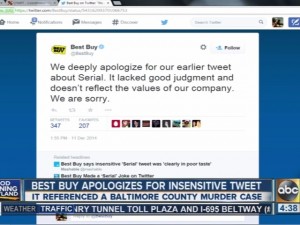There is no more versatile a creation then that of the internet, with the exception of humanity itself. Over the past 40 years or so it has crossed boundaries and sparked movements and passed information faster than any other means before it. Blogging is one of the many forms of communication employed through the internet and, for the corporate world in particular, is well known to offer a multitude of advantages with little of the effort and expense found in “conventional” means. Yet there is a large debate, particularly between the corporate sector and the relations it holds with the general public at large about whether or not such advantages are in fact worth the risk of downfall that can also be part and parcel of the blogging experience.
First and foremost, blogging brings people together; large or small, be it about books, games, sports or the latest phone release, blogging enables a large segment of similarly interested people to communicate on both broad and specialized topics. From a cooperate stand point, this allows them to both introduce their products and to build an image overall that works better “than a billion dollar ad campaign could have” to maintain a more personable presence among their target audience as opposed to a less interactive means such as flyers. (Strother) “Foot-traffic” and word-of-mouth tends to do the rest, reducing time and effort on part of the company and potentially giving them footholds in market areas they might not have reached otherwise. It also allows them feedback on demos and prototypes to better ensure the quality of final products and to address concerns more quickly and broadly than with the limitations posed by mass emails. These same advantages of fluidity and encompassment are not just limited to the PR sector of a company: they can provide the same benefits to the internal structure of a company as well. “Blogs can transform a static, one-way, top-down intranet into a dynamic, interactive collaboration tool that can be felt directly on the company’s bottom line.” (Strother)
Since blogs have become such an integral part of many business’ strategies for attracting revenue, there can be grave consequences to the misuse of a blogs intentions. That same blog which presents a favorable public image can just as easily turn the public against itself with the wrong post. Problems can arise from “bashing” on a competitor to the point of libel, there can be misinterpretations of posts by readers leading to unfavorable rumors. There can also be problems between the company and either former or current employees. When disputes of internal nature become public to one extent or another a company must capitulate to general demand, sometimes in unfavorable ways and to the loss of its credibility. Walmart presents a good overall example with its “Walmart-ting Across America Blog” that attempted to shore up a positive image for the chain in light of poor public opinions regarding its employee treatment policies. So many favorable posts aroused suspicion and led to the discovery of Walmart paying off people to boost their popularity, instead having quite the opposite effect to the point of ridicule. (Kaye) Where information is traded out so publically, it is also very easy for companies to have sensitive information “leaked” to the detriment of profit or reputation.
Despite these many disadvantages, blogging remains one of the first and foremost go-to for the dissemination of information. It can perhaps be argued that all of blogging’s equally many advantages are in fact a by-product of two characteristics that set it apart from all the other means of internet communication: its versatility in any situation and its ability to be the closest means of its kind to mimic group conversation, as opposed to a single chat window or even email. In many ways it is comparable to oral vs. the written language. Both speak broadly and can be used and adapted to many conditions as needed; but the written words is both more accountable for its intent and is able to cross boundaries of space, time and other languages with fewer problems. Overall, the advantage where blogging is concerned over other forms of digitalized communication is slight, but still present and even formidable under some circumstances, outweighing most if not all of its pitfalls.
Sources:
Strother, Judith A., Zohra Fazal, and Melinda Millsap. (2009). Legal and ethical issues of the corporate blogosphere. IEEE Transactions On Professional Communication, 52(3), 243-253.http://ieeexplore.ieee.org/xpls/icp.jsp?arnumber=5210236
Kaye, Kate. Strother, Judith A., Zohra Fazal, and Melinda Millsap. (2009). Legal and ethical issues of the corporate blogosphere. IEEE Transactions On Professional Communication, 52(3), 243-253.http://ieeexplore.ieee.org/xpls/icp.jsp?arnumber=5210236





